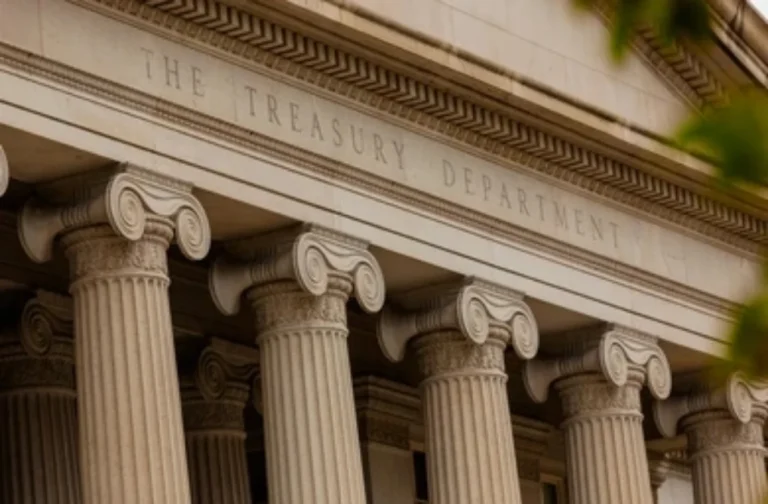In its latest report examining the impact of digital assets, the U.S. Treasury noted that “the growth of stablecoins has led to a modest increase in demand for short-term Treasury securities.”
The 132-page report, published for the Treasury Department’s Borrowing Advisory Committee, discusses digital assets, focusing on major players such as Bitcoin and stablecoins.
US Treasury: Stablecoins boost Treasury demand
“The growth of stablecoins has led to a modest increase in demand for short-term government debt,” the U.S. Treasury said in its latest report on the impact of digital assets.
The 132-page report published for the Borrowing Advisory Committee on Wednesday includes a small section on digital assets based on more prominent players such as Bitcoin and stablecoins.
As the agency stated, “Digital assets have surged from a low starting point. This growth is coming from native cryptocurrencies such as Bitcoin and Ethereum, as well as stablecoins.”
The market capitalization of digital assets remains relatively low compared to other financial and physical assets. This growth does not appear to have affected demand for US Treasuries.
Treasury holdings of Tether revealed
Tether, the company behind USDT, said it keeps a significant portion of the cash backing its tokens in the US Treasury. CEO Paolo Ardoino said Tether holds more Treasury bills than countries such as the UAE, Australia and Spain.
Credit: Bitwise
The US Treasury estimates that nearly $120 billion of stablecoin collateral is invested in US Treasuries. This includes Tether, which holds about $81 billion in government securities. The combined market capitalization of all stablecoins is over $177 billion.
“Stablecoins play an important role in intermediating transactions in digital asset markets,” the report said. Over 80% of all cryptocurrency transactions now include a stablecoin as part of the transaction.
Looking ahead, the ministry looked at the potential for continued growth of stablecoins and potential problems. “Medium-term regulatory and policy choices will determine the fate of this ‘private currency’,” the report says. “History shows that ‘private currencies’ that do not meet regulatory requirements can cause financial instability.” This is therefore highly undesirable.
As the department considers Bitcoin, the structural demand for U.S. Treasuries could increase in proportion to the digital asset’s market capitalization, both as a hedge against downside price movements and as an “on-chain” safe-haven asset. He also said that there is a sex.
Circle CEO: Stablecoins reach $10 trillion market cap
Recently, Circle CEO Jeremy Allaire predicted that stablecoins will become a large part of the global financial system, not just the U.S. Treasury. Circle is a financial services company that issues USDC, the second largest stablecoin in the cryptocurrency market.
Jeremy Allaire is one of the leaders in lobbying for stablecoin regulation in the United States. What many have pointed out is that with proper regulatory guidance, companies can successfully create and grow stablecoin products.
Allaire’s recent interview on the future of the stablecoin ecosystem includes: Like other financial innovations, as technology evolves, stablecoins will account for 5% to 10% of the $100 trillion money supply over 10 years. It included predictions that it would win.
If realized, this would mean the entire stablecoin sector could have a market capitalization of $10 trillion. This is quite ambitious considering its current market capitalization is around $170 billion. Still, USDC’s market cap of $35 billion is relatively low compared to USDT, which has a market cap of over $120 billion.
✓ Share:
Teuta
Teuta is a veteran writer and editor with over 15 years of experience in the macroeconomics, technology, cryptocurrency and blockchain industries. He started his career in 2005 as a lifestyle writer for Cosmopolitan magazine in Croatia and went on to cover business and economics for prestigious publications such as Forbes and Bloomberg. Influenced by figures like Don Tapscott and Bruce Dickinson, Teuta embraced the blockchain revolution, believing that cryptocurrencies are one of humanity’s most important inventions. Her fintech efforts began in 2014 and focused on cryptocurrencies, blockchain, NFTs, and Web3. Known for his excellent teamwork and communication skills, Teuta holds a double master’s degree in political science and law, loves punk rock and Chablis, and has a passion for shoes.
Disclaimer: The content presented may contain the personal opinion of the author and is subject to market conditions. Do your market research before investing in cryptocurrencies. The author or publication assumes no responsibility for your personal financial loss.


